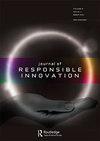机器学习(mis)信息分类的伦理、政治和认知含义:来自社会和数据科学家之间跨学科合作的见解
IF 3.9
1区 哲学
Q1 ETHICS
引用次数: 1
摘要
本文章由计算机程序翻译,如有差异,请以英文原文为准。
Ethical, political and epistemic implications of machine learning (mis)information classification: insights from an interdisciplinary collaboration between social and data scientists
Machine learning (ML) enabled classification models are becoming increasingly popular for tackling the sheer volume and speed of online misinformation and other content that could be identified as harmful. In building these models, data scientists need to take a stance on the legitimacy, authoritativeness and objectivity of the sources of “truth” used for model training and testing. This has political, ethical and epistemic implications which are rarely addressed in technical papers. Despite (and due to) their reported high accuracy and performance, ML-driven moderation systems have the potential to shape online public debate and create downstream negative impacts such as undue censorship and the reinforcing of false beliefs. Using collaborative ethnography and theoretical insights from social studies of science and expertise, we offer a critical analysis of the process of building ML models for (mis)information classification: we identify a series of algorithmic contingencies—key moments during model development that could lead to different future outcomes, uncertainty and harmful effects as these tools are deployed by social media platforms. We conclude by offering a tentative path toward reflexive and responsible development of ML tools for moderating misinformation and other harmful content online.
求助全文
通过发布文献求助,成功后即可免费获取论文全文。
去求助
来源期刊

Journal of Responsible Innovation
Multiple-
CiteScore
8.60
自引率
20.50%
发文量
26
审稿时长
12 weeks
期刊介绍:
The Journal of Responsible Innovation (JRI) provides a forum for discussions of the normative assessment and governance of knowledge-based innovation. JRI offers humanists, social scientists, policy analysts and legal scholars, and natural scientists and engineers an opportunity to articulate, strengthen, and critique the relations among approaches to responsible innovation, thus giving further shape to a newly emerging community of research and practice. These approaches include ethics, technology assessment, governance, sustainability, socio-technical integration, and others. JRI intends responsible innovation to be inclusive of such terms as responsible development and sustainable development, and the journal invites comparisons and contrasts among such concepts. While issues of risk and environmental health and safety are relevant, JRI especially encourages attention to the assessment of the broader and more subtle human and social dimensions of innovation—including moral, cultural, political, and religious dimensions, social risk, and sustainability addressed in a systemic fashion.
 求助内容:
求助内容: 应助结果提醒方式:
应助结果提醒方式:


